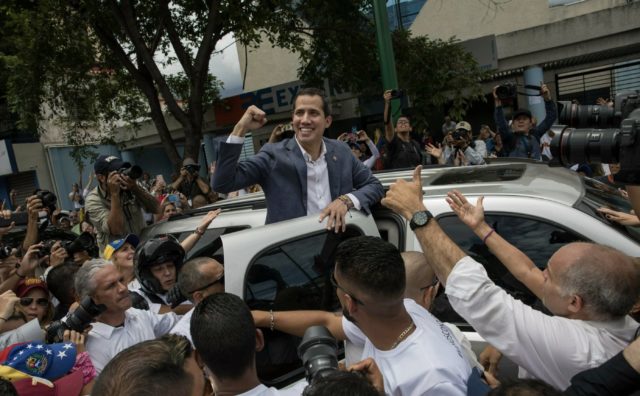
The slow degradation of democracy in Venezuela has culminated in a political crisis unparalleled in the Western Hemisphere in the 21st century. The regime of President Nicolas Maduro has turned increasingly to ruthless measures to retain power, amid election fraud, a wholesale collapse of the Venezuelan economy, and international condemnation. Even with a newly consolidated political opposition, Maduro retains influence over much of the state apparatus and a monopoly on military force. Recent mass demonstrations failed to remove the government in early May. Now, both domestic and international leaders are continuing a coordinated campaign to remove Maduro, even as their options have diminished.
Since its 2015 election victory, the opposition has controlled the National Assembly. In the wake of Maduro’s losses, his loyalists exceeded their authority and created a new parallel organization–intended to replace the constitutional legislature–the so-called constituent assembly. It was under this organization that Maduro announced early presidential elections in 2018. The constituent assembly also banned opposition figures from running.
But Venezuela’s Supreme Court, meeting in exile online, invalidated the 2018 election results and thus vacated the office of the presidency at the end of Maduro’s term. Under Venezuela’s constitution, the Assembly can appoint a president if the office is unoccupied. The National Assembly named Juan Guaidó to the presidency in January. A one-term lawmaker, the 35-year-old Guaido was the Assembly’s leader.
The United States and the international community continue to show support for Guaidó’s leadership and the National Assembly. More than 54 governments have recognized Guaidó as Venezuela’s president, but his movement needs resources to continue mass mobilization and institution building. Even though demonstrations have failed to dislodge the military elite, they provide an important source of popular, legitimate pressure.
To effect change, Washington must take new measures to isolate Venezuela physically and economically. Maduro depends heavily on illicit trade to fund his inner circle, especially as the government’s ability to export oil declines. A recent academic report suggests that trafficking Colombian drugs, money laundering, and other criminal ventures have helped generate tens of billions of dollars in revenue for Venezuelan leaders over the past ten years. Regime cronies often employ their connections with state-owned government entities and other non-state actors “in concert with shared objectives.”
Washington should increase its efforts to combat this illicit trade, as well as continue to isolate oil exports from Caracas. Preventing corrupt officials from skimming aid and trade should also be a priority for the international community. Ultimately, this will squeeze Maduro’s ability to pay off top generals and will starve the government of money needed to fund operations and buy loyalty.
The White House should also attempt to drive a wedge between Venezuela and its proxies, primarily through diplomatic means, but also through restrained military action if necessary. According to media reports, Cuban influence probably derailed high-level defections that could have toppled the regime after early-May demonstrations. Cuba runs a sophisticated intelligence operation in Venezuela; the island nation deployed thousands of security agents to keep Maduro in power. U.S. National Security Advisor John Bolton believes these advisors are acting as a parallel state, keeping the most senior leaders in line even if they have talked with Washington about a post-Maduro future.
Targeting the Cuban-Venezuela movements of people or goods, or the Cuban economy itself could raise the cost of Havana’s meddling in Venezuela’s affairs. Since the United States has recognized the Juan Guaido-led opposition as the legitimate government, and it has asked for Washington’s assistance, the United States can reasonably use force in blocking shipments of weapons and supplies to the Maduro regime. An envoy for Guaidó is scheduled to meet with military leaders from the U.S. Southern Command, which is a step in the right direction. America can also use its cyber capabilities to not only disrupt Cuban operations inside Venezuela but also individuals and infrastructure inside Cuba that actively militarily support the regime.
Recent Developments
The Venezuelan government announced in mid-May the apparent suicide of Major General Jesús Alberto García Hernández from a self-inflicted gunshot wound. Maj. Gen. Hernández previously held the position of assistant director of Venezuela’s Military Intelligence Service, ‘Sebin,’ until his boss, Manuel Ricardo Cristopher Figuera, split with the regime. According to Figuera, his former subordinate “handled sensitive information about the cases of the most frightful and aberrant corruption” at Sebin. Regardless of the suspicious circumstances, the Maduro regime hopes to send a message to others thinking of defecting to keep them in line.
Meanwhile, talks between the Maduro regime and Guaidó’s National Assembly began in Norway late last week. Norway’s foreign ministry characterized the discussions as in an “exploratory phase” with both parties talking to mediators but not yet directly to each other. Guaidó’s has tweeted that Maduro should resign as a condition to the talks, but such a move is likely just posturing. Opposition figures voice concern that the current round of talks, like previous discussions, are merely a regime stalling tactic.

